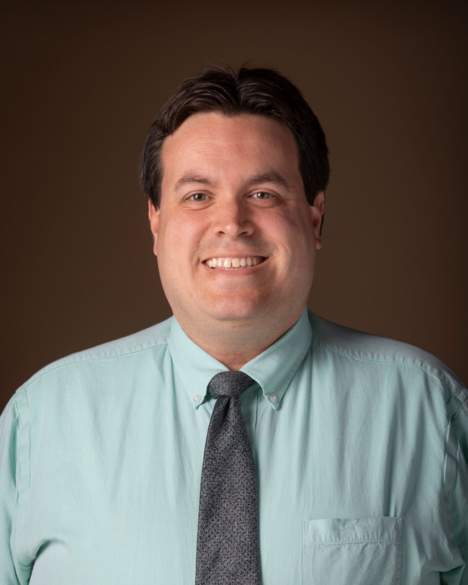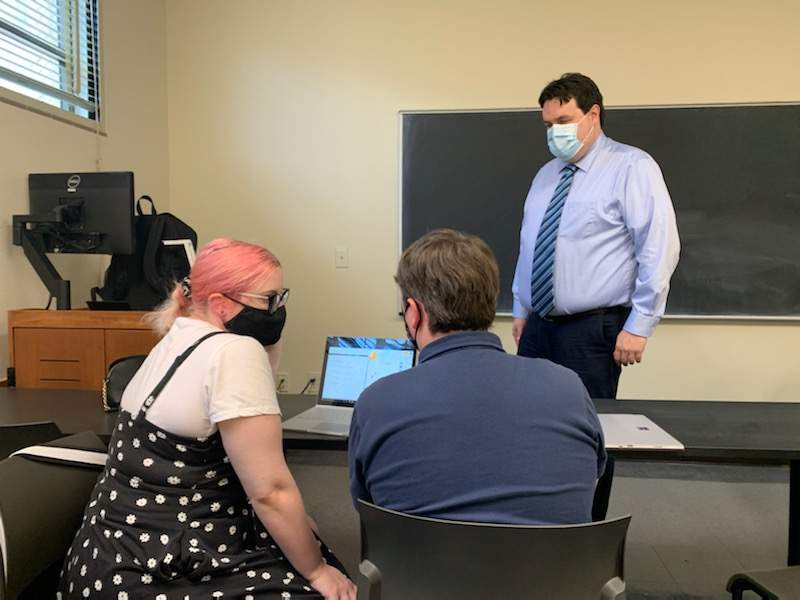Cody Patterson, Teaching Teachers: Shifting Math Education from Rote to Reasoning
Faculty Research Spotlight
Cody Patterson, Mathematics
Teaching Teachers: Shifting Math Education from Rote to Reasoning
“My NSF-funded project shifts the focus from teacher knowledge to teacher discourse: how teachers use language to help students engage in algebraic reasoning.”

Learning algebra continues to present a challenge for both K–12 and college students in the United States. In the Texas statewide end-of-course exam for Algebra I in spring 2018, only 56 percent of students taking the test earned a rating of “Meets Grade Level” or higher, and only 34 percent earned a rating of “Masters Grade Level.” At the college level, only 50 percent of undergraduate students taking college algebra pass the course with a grade of C or better. It is imperative that we improve these numbers because algebra serves as a gateway to most STEM (science, technology, engineering, and mathematics) disciplines.
One major obstacle to student learning is the way classroom activity is structured in many algebra courses. Rather than using algebraic reasoning to solve authentic problems that draw on student experiences, many classes consist of a routine in which students are presented with a new procedure for solving a specific type of abstract problem (such as simplifying an expression or solving an equation) and then are expected to practice using the procedure on similar problems. This approach has a clear payoff – students typically become fluent in the execution of these procedures – but it often deprives students of opportunities to understand the reasoning underlying these procedures or learn to apply them flexibly in novel situations.

Much research aimed at improving the teaching of K–12 mathematics focuses on the mathematical knowledge of teachers. While this is an important and ongoing research focus, I believe that examining teachers’ content knowledge tells only part of the story about why so many students have such alienating experiences with algebra. The template of “introduce a procedure, then practice on similar problems” is endemic to mathematics classes in the United States; because it has been pervasive in most of our experiences as learners, it has a powerful influence on how we structure and plan classes as teachers. This influence holds sway even with teachers who demonstrate exceptionally deep content knowledge of mathematics.
My NSF–funded project shifts the focus from teacher knowledge to teacher discourse: how teachers use language to help students engage in algebraic reasoning. When algebraic activity centers on rote performance of procedures, the language used often emphasizes actions or symbols, such as moving a term to the other side of an equation or canceling symbols in a fraction, without shedding light on the algebraic meaning of these actions or justifying their mathematical validity. To develop a more coherent understanding of algebra, students need to practice using “reasoning language” that attends to mathematical objects and their relationships – numbers, operations, functions, equality, and inequality. My project investigates how teachers use such language and how professional development can support them in broadening students’ access to it.
Our project, Reasoning Language for Teaching Secondary Algebra (ReLaTe-SA), is a partnership between Texas State University, the University of Texas at San Antonio, and the San Antonio Independent School District (SAISD). We are designing and implementing a year-long professional development program for algebra teachers in SAISD. The goal of the program is to bring middle school, high school, and postsecondary mathematics teachers together so that we can learn about how algebraic concepts are presented in different settings and explore possible strategies to broaden students’ opportunities to engage in reasoning, communication, and problem solving.
We do this by participating in several different kinds of activities together:
- Explore challenging algebra problems together and examine these both from the learner and teacher points of view
- Examine student thinking about algebraic concepts (as documented in the research literature)
- Collaboratively design lessons in which students develop understanding of algebraic concepts by working on novel problems that draw upon their real-world experience
In each of these activities, we pay special attention to the role of language and how discourse (such as questioning and revoicing) can create opportunities for student reasoning.
My best advice for people who want to become more competitive applicants for NSF funding is to serve on a review panel. This is a great way to experience how program officers and other experts in your field read project proposals; you write a much more effective project description when you can hear your inner voice asking the questions a reviewer might ask about your proposal!
In putting together a proposal with a strong chance of being funded, think about how your project aligns with current areas of interest in your discipline as well as federal funding priorities. Enhancing student learning in middle and high school algebra is of critical importance across the nation right now (especially in Texas, where it is a key determinant of high school graduation rates and assessments of school quality). The mathematics education discipline has recently shown interest in the impact of discourse on classroom activity as a lens for better understanding student engagement with subject matter. I was fortunate that my project idea happened to lie at the intersection of a problem that is of interest to funding agencies and an approach that my peers view as having significant promise.
This work is supported by the National Science Foundation through the Discovery Research PreK-12 (DRK-12) program (Award #1908825). Any opinions, findings, and conclusions or recommendations expressed in this material are those of the authors and do not necessarily reflect the views of the National Science Foundation.
